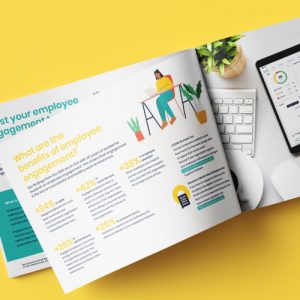How can HR and multinational organisations increase employees’ efficiency?
The five drivers of efficiency

One of the most consistent issues that multinationals face is providing an environment where employees can work efficiently. Of all the 17 HR topics we measure, efficiency is routinely one of the lowest scoring themes. In other words, there are currently too many barriers preventing employees from working efficiently.
Efficiency analogy: Henry the forklift driver
Henry is a forklift driver at a logistics company. Henry loves his job, and loves helping to deliver packages to clients on time. One day he goes into work and discovers that there’s a fault in the forklift battery, and the forklift can’t run at full power. Henry reports the issue to his immediate manager, who asks him to fill in a form about the issue. Once Henry fills in the form, his immediate manager informs him he has to forward it to the maintenance and purchasing department.
The maintenance and purchasing department inform Henry that orders for new batteries are placed once a month, and if Henry hurries and gets the paper work in before 12pm, he can make this month’s order. Unfortunately, as the expense is above €500 Henry now has to fill in a new form to be approved by finance.
Henry is eager to join this month’s order and so he calls to follow up the form he has sent to finance. As soon as someone picks up the phone, Henry is told that his form has joined the waiting list and as it is not a priority, it is unlikely that he will have approval sent back to him before the 12pm order deadline.
Global Employee Engagement Index™
A comprehensive overview of employee engagement with benchmarks from 57 countries with essential lessons for your HR strategy .
DownloadImagine the frustration that Henry now feels, and just how much harder Henry’s job has become. Not only has Henry spent the whole day trying to solve the issue, he now has to drive his forklift at half capacity for the whole month.
Understandably rules are in place to control expenses, however if you want to increase efficiency you need to give up some degree of control. To do this successfully, there needs to be trust within the organisation. Managers need to trust employees to do their jobs, and adopt a management style that reflects this. The alternative is managing according to control, which as Henry’s case illustrates, creates a very inefficient working environment.
For poor old Henry his life would be much easier if he was trusted to take care of his underperforming forklift. If one approval was enough (instead of three), his work would become much more efficient. Imagine the impact on Henry if employees were able to order equipment up to value of €1000, without manager approval.
45% of employees in multinationals report working with effective colleagues
Why efficiency is important
The value of efficiency can best be illustrated by looking at it from both the perspective of an employee, as well as the perspective of an organisation. For employees, working efficiently helps avoid frustrations. If employees invest significant amounts of time and energy into processes where they see little to no return, it causes energy leaks which over time lead to frustrations. It’s rather like banging your head against the wall.
When left unchecked, energy leaks can lead to a situation where employees become frustrated and experience less joy at work. Once this occurs, employees suffer a decrease in engagement and commitment.
For organisations, a high degree of efficiency is important for productivity and financial reasons. Essentially, if companies invest considerable financial resources in employees but get little to no return, it becomes increasingly hard to run a profitable business.
The five drivers of efficiency
3. Employees’ autonomy and empowerment
4. Working with effective colleagues
5. Removal of prohibiting rules and bureaucracy
To discover best practices for the five drivers click on the hyperlinks above. Alternatively, you can download our free report Engaging employees in multinationals which contains best practices, as well as case studies and in-depth analysis.
Book a free demo. See our solutions in action.
Effectory is Europe’s Leading provider of Employee Listening Solutions. Schedule a product demo and discover how to enhance your employees’ engagement.
Demo request
